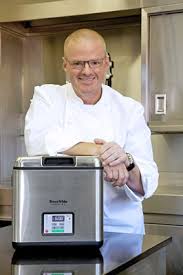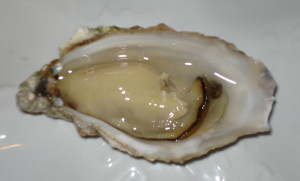It only took a decade.
 In late February 2009, complaints from customers who suffered vomiting, diarrhea and flu-like symptoms began pouring into celebrity chef Heston Blumenthal’s UK restaurant, the Fat Duck.
In late February 2009, complaints from customers who suffered vomiting, diarrhea and flu-like symptoms began pouring into celebrity chef Heston Blumenthal’s UK restaurant, the Fat Duck.
A report by the UK Health Protection Agency concluded that 529 patrons paying a ridiculous amount of money for food-porn styled dishes were sickened with Norovirus – this at a restaurant that only seats 40 patrons per night — introduced through contaminated shellfish, including oysters that were served raw and razor clams that may not have been appropriately handled or cooked.
Investigators identified several weaknesses in procedures at the restaurant that may have contributed to ongoing transmission including: delayed response to the incident, the use of inappropriate environmental cleaning products, and staff working when ill. Up to 16 of the restaurant’s food handlers were reportedly working with Norovirus symptoms before it was voluntarily closed.
Last week it was announced that Heston Blumenthal’s scandal-plagued Australian restaurant appears doomed after its landlord and financial backer, Crown Casino, said it had moved to terminate its lease.
The company behind the Dinner by Heston restaurant appointed provisional liquidators just before Christmas. It came just days after it missed a deadline with the Fair Work Ombudsman to pay back staff the millions it owed them for underpayment.
In a statement Crown said due to the appointment of the provisional liquidator “it has taken action” to terminate the lease of restaurant owner Tipsy Cake Pty Limited.
“While this is disappointing, Crown is working to provide assistance to Tipsy Cake employees looking for employment within Crown,” a Crown spokeswoman said. “The provisional liquidator of Tipsy Cake, however, will need to deal with employee matters at the first instance.”
In December 2018, a Sunday Age investigation revealed that Dinner by Heston was dramatically underpaying staff and Tipsy Cake, the company that owned the restaurant, was based in a notorious tax haven.
The investigation revealed chefs at the Southbank eatery regularly worked 25 hours of unpaid overtime a week. That pushed pay down to as little as $15 to $17 an hour, well below the minimum rates of the award, the wages safety net.
The Fair Work Ombudsman soon after launched an investigation.
The spokeswoman said Crown would allow customers who purchased Dinner by Heston gift cards to exchange them for Crown gift cards. No timeframe was provided by Crown on when the lease of one of its high-profile tenants would end.
The move to terminate the lease creates further uncertainty for employees who had hoped that Crown may financially support the restaurant to keep it open.
Crown had provided the business – one of its marquee tenants – with a $750,000 interest free loan. Industry sources said the interest free loan could have been used as a way to lure such a high profile business to the casino, boosting its appeal to visitors
Before Christmas Fair Work Ombudsman Sandra Parker said it was disappointing that Tipsy Cake had not resolved the underpayment issue before it went into provisional liquidation.
Accounts for the Dinner by Heston restaurant show it has reported persistent losses since opening in Melbourne in 2015.
The accounts disclosed it was dependent on interest free loans from a related company run through a Caribbean tax haven and Crown Melbourne ‘’to continue operating’’.
But its opaque structure – restaurant owner Tipsy Cake is based on the volcanic Caribbean island of Nevis – made it hard to determine the true health of the business.
The ownership of companies incorporated in Nevis is never disclosed so there is no way to know who is behind companies created there.
But the company has said Blumenthal sold his shareholding more than a decade ago but remained its chef patron and “integral’’ to its operation.
Once a hack, always a hack.
RIP Neil.









.jpg) And contact health types.
And contact health types.